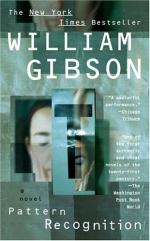|
This section contains 670 words (approx. 3 pages at 300 words per page) |

|
SOURCE: Rucker, Rudy. “Logomancer.” Wired 11, no. 2 (February 2003): 64.
In the following review, Rucker praises Pattern Recognition for its thematic scope and “the sensual pleasure of its language.”
Science fiction has long been William Gibson's electric guitar—the instrument he uses to gain perspective, to transform life's ditties into anthems of transcendent strangeness. In Pattern Recognition, he goes acoustic, unplugging the overt sci-fi tropes that have marked his work and producing a mainstream product. He succeeds because our real world has such gnarly tech (Web surfing on a laptop with a Wi-Fi connection is functionally the same as jacking your brain into a cyberspace deck) and because his riffs make such a good read.
What Gibson gives us is an international spy thriller comparable to the slightly skewed tales of Jonathan Franzen or David Foster Wallace. His story's central McGuffin is a fragmentary, workstation-rendered romance movie known simply as The...
|
This section contains 670 words (approx. 3 pages at 300 words per page) |

|


